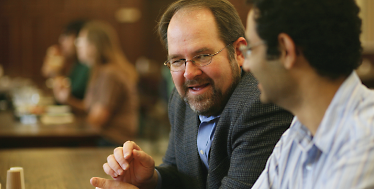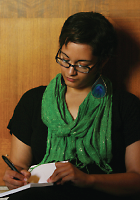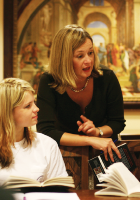An Honorable Pursuit
In 1957, the U.S.S.R. took an early lead in the "space race" by launching Sputnik, the first man-made object to orbit the Earth, sparking fear that the United States was losing its collective edge over the Soviet Union. That fear led to a renewed interest in programs that challenged and trained the brightest minds in science, technology and research at American colleges and universities, according to honors education researcher Dr. Frank Shushok, BS '91. Honors programs became a focus of efforts to reach these students and by 1959, the Baylor Honors Program had enrolled its first class; eleven of those students became Baylor's first Honors graduates in 1961.
Fifty years later, Honors education at Baylor is coming into its prime. A concerted effort by faculty across disciplines has resulted in a desirable, finely tuned experience for Honors students, who are enrolling and graduating at unprecedented rates. In the past six years, the Honors Program has tripled the number of graduates per year, the number of majors represented in graduating classes, and the program's retention rate.
In 2002, the Honors Program became part of the newly established Honors College, which bolstered and expanded Baylor's tradition of attracting and educating excellent students. The Honors College includes four programs: Baylor Interdisciplinary Core, the Honors Program, University Scholars, and Great Texts, in addition to student housing opportunities in the Honors Residential College (see chart on page 29). From serving only a handful of students in 1959 to nearly 1,400 today, clearly, Honors at Baylor is something to celebrate.
Intangible Integration
The recent success of Baylor Honors is largely due to its distinct emphasis on collaboration and integration.
"One of the important things about the Honors College is that it collaborates with all other undergraduate schools and programs," says Dr. Thomas Hibbs, dean of the Honors College. "The size and complexity of Honors College offerings means that it can reach a larger percentage of students at Baylor than honors colleges typically reach at other places."
Because approximately 10 percent of Baylor undergraduates are members of the Honors College, Baylor has 25 faculty devoted fulltime to Honors programming, in addition to the dozens of professors who teach Honors courses and volunteer to guide individuals through the thesis process in virtually every major. Their work is helping to unify parts of the university that, at times, have had little
interaction."There is a great deal of fragmentation and isolation in higher education and in student life," says Hibbs of universities across the nation. "Students don't know faculty; faculty don't know one another. One of our projects is to overcome that by putting things back together."
A Well-Rounded Approach
The Honors College shares one distinctive that's long been true for Baylor: the impetus to educate well-rounded students who consider faith a vital part of life at Baylor and beyond.
Five years ago, Hibbs was attracted from Boston College to Baylor's Honors College by its distinct vision of interdisciplinary education. Hibbs says that at many campuses, Christian and non-Christian alike, it's common that certain kinds of important questions and authors can be ignored. But at Baylor, he saw something different.
"It struck me that what Baylor was up to was seeing faith as something that was not so much an imposition on academic or scholarly life, but something that opened it up more," says Hibbs.
"The curriculum is designed to help students make connections between different parts of what they're learning, at an avowedly Christian university. We want students to leave saying that their Baylor experience was one in which the parts fit together, in which they could make sense of their education, and in which it made sense in terms of their future career goals and in terms of their lives as believers," Hibbs continues.
And, well, students are saying precisely that.
"The Honors community takes Baylor's commitment to Christian education seriously, recognizing that faith and reason are not opposed and that the life of the mind can be lived as a Christian vocation," says senior Brock Scheller. "I will carry the serious reflections and discoveries of faith which I have had at Baylor throughout my life."
Faculty and Student Connections

While Baylor students traditionally have built strong relationships with faculty, the Honors College grants opportunities for every Honors student to enjoy extensive one-on-one time with professors. And because all Honors faculty teach small freshman classes, students can build relationships over four years with some of the best teachers on campus.
Dr. J. Wesley Null, faculty assistant director of the Honors Program, is one of many Baylor professors who values his chance to mentor top students through the Honors College.
"It's an opportunity to get to know students on a personal level through one-on-one tutoring and mentoring," says Null.
And because of Baylor's long-popular pre-med track, the Honors College works closely with the medical humanities, biology, sciences and the pre-health professions office. Pre-med combined with Honors continues to be a major draw for top students. In fact, roughly half of Honors students are pre-med majors.
One student who stands out in Null's mind is Roselynn Nguyen, BA '08. As a freshman, Nguyen took Null's Great Texts course, then occasionally visited with him as a sophomore. At the junior level, Honors students begin working on what are called independent readings courses, when students work individually with professors to choose a thesis topic.
"I directed Roselynn's independent readings courses, and then I directed her thesis as a senior," says Null. "So, we stayed in touch during her four years as an undergraduate, and, as a result, really developed a good relationship.
"Roselynn did a first-rate thesis, and now she is doing quite well at UT Southwestern Medical School in Dallas," Null adds. The two keep up with each other today via Facebook.
Nguyen says that Null was not merely a professor, but someone who influenced many parts of her life. Under Null's guidance, Nguyen presented her thesis project at a conference in Chicago and later had it published in the American Educational History Journal. She was also able to talk about her experience in her medical school interviews. However, Nguyen says her mentor relationship was about much more than getting into medical school.
"The most significant impact was the privilege of having such thought-provoking, meaningful conversations with Dr. Null," says Nguyen. "Because my thesis discussed the 'unity of truth,' we often connected subjects I learned in classes at Baylor to a bigger picture: my professional goals and how I was to take these lessons to live out a Christian life. The atmosphere at Baylor provides an excellent place to connect spiritually with my peers, but this project allowed me to also connect on a spiritual level with my mentor. It was very enlightening to have the opportunity to engage in conversations not confined to topics taught in the classroom, but instead, encompassing everything from chemistry and history to literature and religion."
Rich academic and student life
Adding to the academic success is the sense of community found in the Honors Residential College (HRC). More than 300 Honors College students live in the HRC in Memorial and Alexander Halls alongside internationally renowned scholar Dr. Sarah-Jane Murray, who resides in the hall as Faculty Master. In addition, Great Texts faculty offices are housed in Brooks Residential College, where many Honors and non-Honors students reside. Students are raving about their experience and signing up to stay another year.

"The HRC has created a flourishing community of diverse and yet similarly-inclined students who mutually reinforce each other in a healthy and vibrant life together, leading from student-led study sessions and helpful people up the hall all the way to late-night lobby life, where students seem inevitably to flock and 'study' (i.e., hang out)," says Scheller.
Two-thirds of residents at HRC and Brooks Residential College were retained this year, a rate unprecedented at Baylor. And others have taken notice. Collegiate Way, the premier newsletter on residential colleges, recently noted that Baylor is now in competition with Rice as the foremost university for residential colleges in Texas, and delegations from MIT, SMU, Texas A&M and the University of Arkansas have come to campus to study Baylor's residential colleges.
Shushok, Baylor's dean for student learning and engagement, has looked at many Honors colleges and programs as part of his research into strategies for student engagement. He agrees that what Baylor has in its Honors Residential College is "really quite extraordinary"--an environment that brings the community together across classifications and majors, facilitating relationships among students and faculty.
"The students have a real seriousness about their intellectual endeavors, and that environment really cheers them on in a way that they need," says Shushok. "It facilitates mentorship of older students to the new student, and it helps put faculty, staff and students in position for the serendipitous kinds of encounters that are often life-changing."
Transformational Outcomes
While hard data and interest from other universities are clear indicators of recent Honors successes, Honors Program director Dr. Andrew Wisely says the most meaningful impact still happens beyond the numbers, in the minds of individual students.

"We want people to know that Honors isn't just sort of an add-on thing," Wisely says. "It's not just an extra star on your résumé, but it is truly transformational--it's not just supplemental for any major, but it transforms the way you think because you're in a smaller class and dealing with primary texts. You're not having that mediated by someone else's idea of what the texts are about."
Hannibal, Missouri, native Christopher Babcock, BA '03, can attest to the difference that a Baylor Honors education has made in his life. Not sure of a career path, but interested in religious studies, Babcock looked into Baylor on the suggestion of a Baylor alumnus at his church.
Babcock began studying religion and was involved in Baylor's nationally renowned Air Force ROTC program. He was attracted to University Scholars because it offered him the chance to diversify his studies in preparation for his future in U.S. Air Force intelligence.
"I wanted to pick up some more Middle East studies, and other classes that would make me a more appealing candidate for intelligence without sacrificing the upper level Greek, Latin and classics courses I was enjoying," he explains.
Babcock says his first year in the program was when University Scholars started its new curriculum, with Great Texts courses and a required thesis, which helped him to learn the value of research. He was the first University Scholars major to complete a thesis under the auspices of thte Honors College, and Dr. Alden Smith says it's one of the best he's seen. Smith is the University Scholars program director and guided Babcock's thesis.
"Dr. Smith was an excellent mentor. He really pushed me, kept me going after higher-level courses," Babcock says. "It was a great opportunity for me, to write a 60-page thesis helped me learn how to research and how to think, to look at what has been said and then look for new angles. The Great Texts courses were incredibly appealing to me, the chance to get an overview of the seminal works in Western thought."
After Baylor, Babcock served as an airborne intelligence officer in the U.S. Air Force for several years, including six deployments to southwest Asia. As a member of the aircrew, some of Babcock's duties included analyzing new technologies and emerging threats and coordinating with other intelligence platforms to get the best idea of the battle space. Babcock recently completed his first semester at Harvard Law School.
"University Scholars offered the benefit of truly learning to think in college--not just learning information, but learning how to approach information and apply the information to a bunch of new situations. Instead of pigeonholing myself into a specific career, it let me really push myself and look at some aspects of learning, some classes I wouldn't have had the chance to take otherwise. And that was a huge advantage for me in my undergraduate education. I'm really grateful I went to Baylor, and I loved the program."
Honors education at Baylor has an impressive 50-year history, and with the creation of the Honors College, the last seven years have been some of the best. But without a doubt, the brightest times lie ahead, says Hibbs.
"I'm most excited about seeing what we can accomplish in the next 10 to 20 years, to see what kinds of students we can attract, what kinds of scholarship we can help our students to produce, and what kind of things they'll do after they graduate from Baylor.
"Sometimes people have forgotten that having these kind of programs is not just about recruiting the best students, but also about how you nurture them. This is something Baylor does extraordinarily well; we take bright students and give them the kind of attention and mentorship to launch them forward into whatever future course of study or professional life they might pursue," Hibbs adds, noting that the fruits of that labor can be seen in the number of students receiving national scholarships and awards, along with the outstanding graduate, law and medical schools Baylor alumni attend.
"Because we have so many students involved in the Honors College and because they participate in majors across the entire university, these students help to elevate the level of conversation and influence the intellectual ethos of the campus," says Hibbs.
Goals for the Future
Even with all its success, the Honors College has much work to do both on and off campus.
To attract the best students and aid the most needy in attending Baylor, the Honors College wants to continue adding to a recent $5 million endowed scholarship fund provided generously by Clifton, BBA '63, and Betsy, BA '71, Robinson. In addition, Hibbs hopes to create an endowment for the naming of the Honors College and build the Honors College Excellence Fund, which goes directly toward needs like attracting more nationally recognized professors, distinguished lecture series and faculty development.
Attracting more out-of-state students is also a priority. Hibbs says those alumni living out of state can help spread the word about Baylor's Honors College.
"Our Honors College helps Baylor to be even more competitive in terms of national recruitment. We want our best ambassadors, our alumni, to get actively involved with student recruitment at high schools and churches, to spread the word about the Honors College to top students."
Even with the number of majors represented on campus rapidly expanding, Hibbs wants to see Honors opportunities spread further around campus. Hibbs estimates that half of incoming students express interest in pre-med or the sciences, but most Honors faculty are humanities professors. To help better bridge the gap, professors Troy Abell and Lisa Baker have been appointed to senior lecturer positions with the specific focus of mentoring pre-med and science students. Both have extensive experience with medical schools and research universities.
"These professors' aim is to raise the level of advising and mentoring for science students to the same level provided for students in the humanities," says Hibbs. "Our students going off to med school ought to be as academically prepared as any in the country, but there also should be something distinctive about the way they see medicine and understand their patients, how they think of the life of a doctor as a vocation."
Building upon a distinguished 50-year history, the Baylor Honors College continues to challenge the hearts and minds of young men and women toward faith-based scholarly life, launching them on a trajectory of lifelong success and service. Truly an honorable pursuit.
From graduate students at Yale and Harvard Law to cardiologists and neurosurgeons, from university deans and missionaries to CEOs and scientists, from high ranking military officers and U.S. representatives to teachers and professors, Honors alums make meaningful contributions in a variety of fields across the country and around the world. We've contacted a few of these grads to talk about how their Honors experience at Baylor prepared them for life after Baylor. Click here for a web exclusive.
